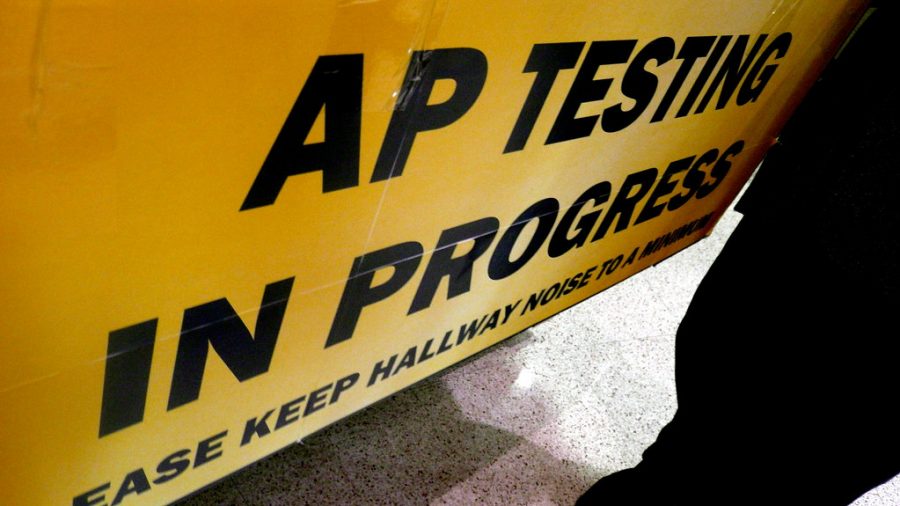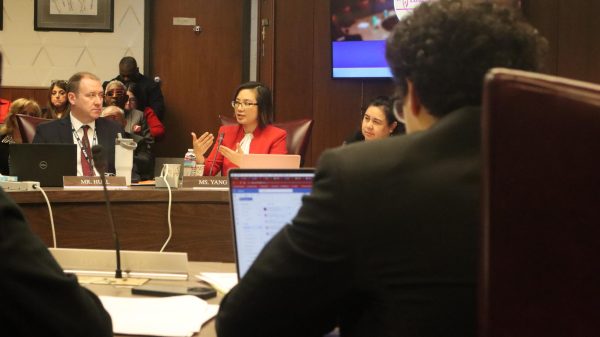Collegeboard’s decision to revert to standard AP tests disproportionately hurts students
Students participate in AP testing at Neuqua Valley High in May 2019.
March 24, 2021
Every year, over five million students take AP exams in the United States. These dedicated students pour in hours of studying to achieve high scores and earn college credit. Last year, with COVID-19 drastically changing the educational world, the Collegeboard decided to administer online-format abridged tests to accommodate for the unusual circumstances. They replaced the multiple-choice and essay sections with 50-minute free-response exams. Additionally, the exams only tested the course units that a majority of schools were able to teach before quarantine started.
However, even though the majority of students have spent the entire year learning virtually, the Collegeboard has decided to revert to the original full-length, full-topic AP tests. Due to discrepancies between learning environments across the country, this decision will unevenly and unfairly impact students. The Collegeboard should return to last year’s testing format if they wish to accurately measure the ability and knowledge of students this year.
Students in online school are put at a disadvantage due to a lack of instructional time in each class. Teachers have to accommodate by shortening some lessons and skipping others entirely, meaning that students are not learning everything assessed in traditional AP exams. Spanish teacher Nicole Sloane said “[students] need to have the opportunity to learn whatever they need to learn, and if that means they have to wait to administer the test, I think they should.”
To make things worse, students struggle with staying focused during long hours on Zoom and an isolating work environment. Specific home situations also contribute to difficult learning conditions as some must look after younger siblings or care for their grandparents while their parents are at work. In other cases, noisy living spaces can make it difficult for students to concentrate and absorb content during class. An absence of structured in-person learning leaves many students unable to gain the necessary information to perform well on this year’s AP exams.
Freshman Advika Agarwal said, “Online learning has become distant, disconnected and disorganized […] for the first time, I’ve found myself unnecessarily staying up late every night, wasting time when I try to study and mixing up priorities.” With all this instability, students improperly divide their time on what truly matters, reflected by the nationwide decrease in multiple standardized test scores. Brookings found that the median Measure of Academic Progress (MAP) scores from 2020 were five to ten percentile points lower than the median scores in 2019.
Some regions in the country have aimed to counter this dip in performance through hybrid learning models and reopenings. According to CNN, states like Arkansas have been requiring schools to be open five days a week since August, but some such as Maryland are still slow in returning students to school. In-person schooling is much more effective at teaching than online school, as is shown in Brookings’s study. However, this only creates a larger disparity between in-person and online students, meaning the AP exams are only designed for a small portion of the population.
The lack of a nationally implemented reopening plan leaves states to come up with varying policies that result in inconsistencies in education. Montgomery County Public School has decided to open in two phases, starting midway through March and ending in late April, while schools in Auburn County, Washington, have been open since Feb. 22.
Since MCPS’s schools are opening relatively late, Richard Montgomery students will receive less class time and put them at an even greater disadvantage. Additionally, with many students opting to stay virtual, it is absurd to think that they will be equipped with the knowledge to take the full tests. It only makes sense that the Collegeboard should redesign this year’s test to account for these circumstances just as it did last year.
AP exams carry considerable weight in students’ academic careers and the acquisition of college credits. The Collegeboard’s decision to revert to normal testing procedures disregards the limitations that online learning has created this year. The strain that the ongoing pandemic puts on students must be considered when crafting this year’s exams to ensure fairness and achievable success. If the Collegeboard fails to change this year’s AP test structure, they will be another source of burden during an already dark time.












